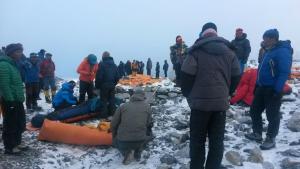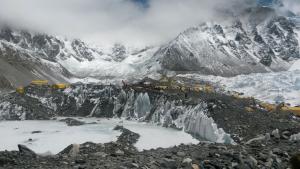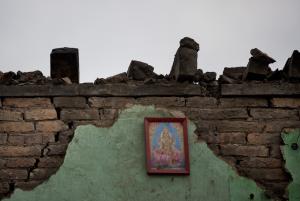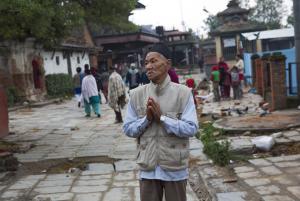KATHMANDU, Nepal (AP) — The death toll from Nepal's earthquake soared past 3,700 Monday, and how much higher it would rise depended largely on the condition of vulnerable mountain villages that rescue workers were still struggling to reach two days after the disaster.
Reports received so far by the government and aid groups suggest that many communities perched on mountainsides are devastated or struggling to cope. Udav Prashad Timalsina, the top official for the Gorkha district, near the epicenter of Saturday's quake, said he was in desperate need of help.
"There are people who are not getting food and shelter. I've had reports of villages where 70 percent of the houses have been destroyed," he said.
He said 223 people had been confirmed dead in the district but he presumed "the number would go up because there are thousands who are injured."
Saturday's magnitude 7.8 earthquake spread horror from Kathmandu to small villages and to the slopes of Mount Everest, triggering an avalanche that buried part of the base camp packed with foreign climbers preparing to make their summit attempts.
Timalsina said his district had not received enough help from the central government, but Jagdish Pokhrel, the clearly exhausted army spokesman, said nearly the entire 100,000-soldier army was involved in rescue operations.
View gallery

In this Sunday, April 26, 2015 photo, people critically injured in an avalanche are wrapped to be ev …
"We have 90 percent of the army out there working on search and rescue," he said. "We are focusing our efforts on that, on saving lives."
Nepal police said in a statement Monday that the country's death toll had risen to 3,617 people. That does not include the 18 people killed in the avalanche, which were counted by the mountaineering association. Another 61 people were killed in neighboring India, and China reported 20 people dead in Tibet.
Well over 1,000 of the victims were in Kathmandu, the capital, where an eerie calm prevailed Monday.
Tens of thousands of families slept outdoors for a second night, fearful of aftershocks that have not ceased. Camped in parks, open squares and a golf course, they cuddled children or pets against chilly Himalayan nighttime temperatures.
They woke to the sound of dogs yelping and jackhammers. As the dawn light crawled across toppled building sites, volunteers and rescue workers carefully shifted broken concrete slabs and crumbled bricks mixed together with humble household items: pots and pans; a purple notebook decorated with butterflies; a framed poster of a bodybuilder; so many shoes.
View gallery

A rescue chopper prepares to land, carrying people from higher camps to Everest Base Camp, Nepal, Mo …
"It's overwhelming. It's too much to think about," said 55-year-old Bijay Nakarmi, mourning his parents, whose bodies recovered from the rubble of what once was a three-story building.
He could tell how they died from their injuries. His mother was electrocuted by a live wire on the roof top. His father was cut down by falling beams on the staircase.
He had last seen them a few days earlier — on Nepal's Mothers' Day — for a cheerful family meal.
"I have their bodies by the river. They are resting until relatives can come to the funeral," Nakarmi said as workers continued searching for another five people buried underneath the wreckage.
Kathmandu district chief administrator Ek Narayan Aryal said tents and water were being handed out Monday at 10 locations in Kathmandu, but that aftershocks were leaving everyone jittery. The largest, on Sunday, was magnitude 6.7.
View gallery

A portrait of Hindu Goddess Lakshmi hangs on the remains of a house that was damaged in Saturday’s e …
"There have been nearly 100 earthquakes and aftershocks, which is making rescue work difficult. Even the rescuers are scared and running because of them," he said.
"We don't feel safe at all. There have been so many aftershocks. It doesn't stop," said Rajendra Dhungana, 34, who spent Sunday with his niece's family for her cremation at the Pashuputi Nath Temple.
Acrid, white smoke rose above the Hindu temple, Nepal's most revered. "I've watched hundreds of bodies burn," Dhungana said.
The capital city is largely a collection of small, poorly constructed brick apartment buildings. The earthquake destroyed swaths of the oldest neighborhoods, but many were surprised by how few modern structures collapsed in the quake.
On Monday morning, some pharmacies and shops for basic provisions opened while bakeries began offering fresh bread. With power lines down, spotty phone connections and almost no Internet connectivity, residents were particularly anxious to buy morning newspapers.
View gallery

A Nepalese elderly man prays next to a building damaged in Saturday's earthquake, not pictured, …
Huge lines of people desperate to secure fuel lined up outside gasoline pumps; prices were the same as they were before the earthquake struck.
"We are not raising prices," fruit seller Shyam Jaiswal said. "That would be illegal, immoral profit."
As aid began pouring in from more than a dozen countries, aid workers warned that the situation could be far worse near the epicenter. The U.S. Geological Survey said the quake was centered near Lamjung, a district about 80 kilometers (50 miles) northwest of Kathmandu. While not far away, poor roads and steep mountains make Lamjung difficult to reach. Even before the quake, it could take six hours to drive from Kathmandu to parts of the area. Now, many of the few roads are believed to be cut off by small landslides.
The earthquake was the worst to hit the South Asian nation in more than 80 years. It and was strong enough to be felt all across parts of India, Bangladesh, China's region of Tibet and Pakistan. Nepal's worst recorded earthquake in 1934 measured 8.0 and all but destroyed the cities of Kathmandu, Bhaktapur and Patan.
The quake has put a huge strain on the resources of this impoverished country best known for Everest, the highest mountain in the world. The economy of Nepal, a nation of 27.8 million people, relies heavily on tourism, principally trekking and Himalayan mountain climbing.
___
Associated Press writers Muneeza Naqvi and Tim Sullivan in New Delhi contributed to this report.
Related Video: